#Alter Rebbe
Text
Audio - Lessons in Tanya 84
Beginning of Chapter 44. This chapter returns to Love of Gd, working with the two level of love we outlined in the previous chapter. Here was see that lower love of Gd is manifest in fulfilling the Torah and its commandments while love is the yearning of the soul to be connected with the divine. He introduces a third approach, one which combines both the lower and upper levels of love. This is…
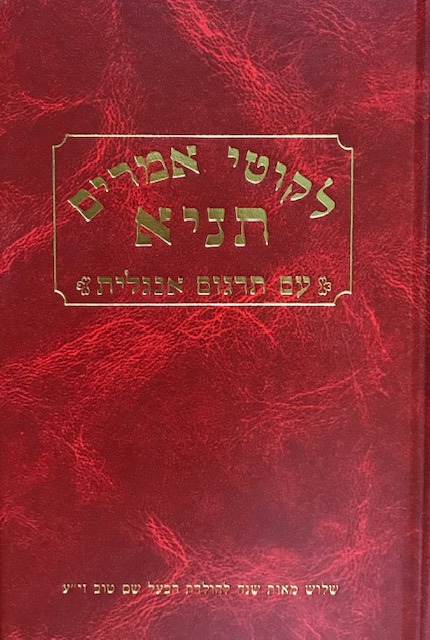
View On WordPress
#ahavah rabba#ahavat olam#Alter Rebbe#Lessons in Tanya#love of Gd#new beginnings#new beginnings spiritual coaching and consulting llc#podcast#podcasts#spiritual growth#Spirituality#Tanya
0 notes
Text
>watching House
>subtitles say "The Alter Rebbe's niggun"
>It's the frum people episode!
How many of you have watched the episode of House with the patient who's a newly married Lubavitch baalas teshuva? In terms of frum patient episodes of procedural TV... it wasn't that bad!
8 notes
·
View notes
Note
Hey so question: was looking at mezuzah cases and the one seller offered scrolls to go with, but they mentioned that the scrolls might not be considered kosher for Chabad or Lubavitch. Any idea why this might be?
So, first off, Chabad and Lubavitch are essentially the same thing.
The seller was probably referring to the fact that many in the Chabad Lubavitch movement only use mezuzot that use either the Alter Rebbe script or the Arizal script, since those incorporate the Kabbalistic and Chassidic values of the movement. So, if the Mezuzot you're looking aren't written in those fonts, then they likely wouldn't be preferred by Lubavitchers. It's all down to Minhag (custom).
32 notes
·
View notes
Text
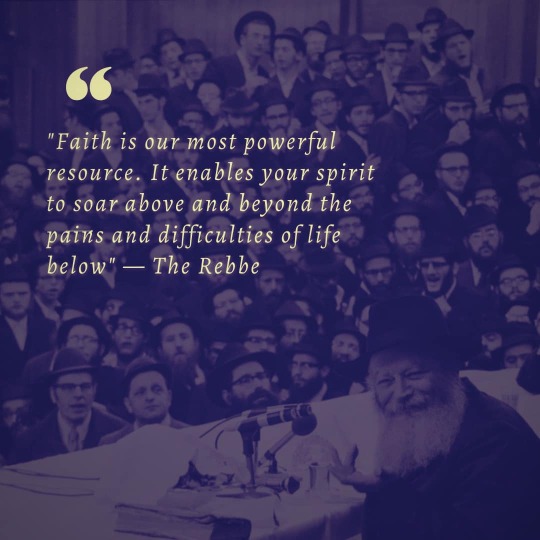
Right now our faith is being challenged in a way it never has before. Faith, as the Rebbe so eloquently teaches us, isn't a relic of the past; it's the very backbone of our existence. You see, faith isn't about ignoring reason, but transcending it. It's the spark that lights up the dark alleys of doubt, and a lighthouse guiding us through the stormiest seas of life.
You say you're skeptical? To even question G-d is an act of faith in itself! It's like having a conversation where you speak more in the subtext than the text. Your soul is already dialoguing with its Maker; you just need to consciously join the conversation.
Are we afraid of faith? Ah, yes, fear—the age-old guardian at the gates of change. If you're fearful of how faith will alter your life, you're already acknowledging its transformative power. Faith isn't a crutch; it's a rocket ship aimed at the heavens, propelling you to heights you couldn't even dream of. Don't fear change; embrace the journey!
Now, about cultivating this beautiful gemstone called faith. We are all miners at heart, and this gem is embedded within us from the day we are born. As children, we have an innate faith, unfiltered and pure. But, alas, the mine gets filled with the debris of life experiences and skepticism. We must dig deep, remove the rubble, and let that natural gem shine once again.
You see, true faith isn't just about belief; it's about trust. Trusting that the Conductor of this universal orchestra is playing a symphony so complex, so breathtakingly beautiful, that our ears can only catch the faintest melodies.
Questions and doubts are a part of our journey. They are the wrinkles on the fabric of faith, adding depth and texture.
To truly feel G‑d's presence, we must do one simple thing: listen. In the noise of your thoughts, in the cacophony of your doubts, there's a still, small voice trying to be heard. That's G‑d whispering, "I am here."
So, let's make space for that voice. Let's free ourselves from overthinking and allow our faith to resurface, as natural as the first rays of the dawn.
Remember, faith isn't just our heritage; it's our most powerful resource. It allows your spirit to soar, to sing, to dance, to embrace life wholeheartedly.
The world needs you to be strong right now, the world needs your unwavering faith.
Am Yisrael Chai!
Rabbi Yisroel Bernath
9 notes
·
View notes
Text
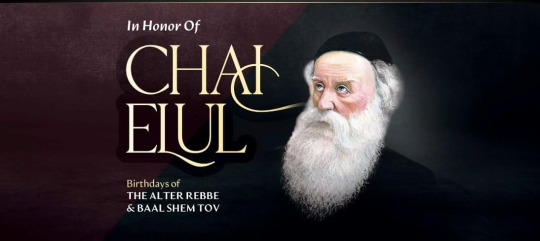
Today—Chai Elul—a day that’s the spiritual equivalent of a double shot of espresso for the soul. Today we celebrate the birthdays of two colossal figures in the Jewish world: the Baal Shem Tov and the Alter Rebbe. Imagine if two of the greatest people you knew had the same birthday and you'll get the sheer magnitude of this day in the Chassidic calendar.
The Baal Shem Tov is like your favorite teacher from school, the one who made you see the world as a place bursting with possibility. He taught us that G-d isn't just in the heavens or ancient texts; He's right here, right now, in your everyday experience. The Baal Shem Tov's teachings say, "Why just exist when you can truly live?"
Now enter the Alter Rebbe, who adds a layer of finesse to this robust enthusiasm. He’s the sophisticated chess master who teaches you the rules so you can appreciate the complexity of the game. With the intellectual rigor of Chabad Chassidus, he tells us, "Sure, feel the thrill of the divine, but let's also understand the 'why' behind the 'wow.'"
So, why does this matter, especially as we navigate the soul-searching month of Elul? Because the teachings of these two luminaries empower us to approach Elul as active participants, not just heavenly beggars. "I am my Beloved’s and my Beloved is mine" becomes an interactive relationship. You're not just receiving G-d's love; you're reciprocating it with your own spiritual flair.
Chai Elul gifts us a spiritual adrenaline rush, making Elul not just a month of reflection but one of dynamic spiritual activity. It’s the day when your soul feels like it’s put on its best dancing shoes, ready to groove to the divine rhythm.
So, on this Chai Elul, let’s not just count our years, let’s make our years count. Put on your spiritual dancing shoes and feel the beat of the Baal Shem Tov's faith meet the intellect of the Alter Rebbe. And as we do, may we all be inscribed for a year that's as vibrant and meaningful as the legacy these two giants left us.
Rabbi Yisroel Bernath
14 notes
·
View notes
Text

Bielsko-Biala, Poland. Portrait of the daughter of the “Byaler Rebbe” Avrom Yehoshua Rabinovich, photographed by Alter Katsizne
4 notes
·
View notes
Video
youtube
https://www.youtube.com/watch?v=c7nZsvw4QPI
Kol Dodi is a verse from the Song of Songs, the megillah that we read at Pesach. Much of the Song of Songs is NSFW, although there are plenty of people who work furiously to re-interpret the text to make it a bit more SFW, although it never really quite gets there. The Alter Rebbe of Chabad (the one who really hated Napoleon) composed this melody, although I’m fairly sure that he didn’t intend for it to be sung by a woman or to sound as dance-like as this. You can hear some Chabadniks singing it here, and see what you think of the difference. Either way, it’s a great melody -- in fact, the “either way” is part of what makes it a great melody. You can play with it, massage the vocal textures, the rhythm, the instrumentation, and it holds up to all of that artistic choice and variation. That’s a good strong melody for you right there.
4 notes
·
View notes
Text
Similarly with the conquest of one’s evil nature.
Despite the fact that the good nature is stronger than the evil, for as explained in previous chapters, “Even a little of the light of holiness dispels much darkness of the kelipah,” yet here, too, the previous rule applies; and thus:
It is impossible to conquer the evil nature with laziness and sluggishness, which stem from sadness and a stonelike dullness of the heart,
but rather with alacrity, which derives from joy and an open i.e., responsive heart that is unblemished by any trace of worry and sadness in the world.
As for the verse, “In every sadness, there will be profit,”1 which means that some profit and advantage would be derived from it,
the wording (“there will be profit”) implies that, on the contrary, the sadness itself has no virtue, except that some profit will ultimately be derived from it.
This profit is the true joy in G‑d, which follows the true i.e., justified sadness over one’s sins, with bitterness of soul and a broken heart, which must come at specific, suitable times.
Hence, the “profit” of sadness is the joy that follows it.
Why should this sadness lead the worshipper to joy? For thereby (through one’s sadness) the spirit of impurity and of the sitra achara is broken and so, too, the “iron wall” that separates him from his Father in heaven,
as the Zohar comments2 on the verse, “A broken spirit, a broken heart, [You will not despise].”3
The Zohar interprets the verse as follows: “A broken spirit of the sitra achara is brought about by means of a broken heart….” Since sadness over one’s sins causes the sitra achara to be broken and the “iron wall” to vanish, it leads one to rejoice—as the Alter Rebbe now goes on to say:
Then the preceding verses will be fulfilled for him: “Make me hear joy and gladness…”4; “Restore to me the joy of Your salvation, and [support me] with Your generous spirit.”5
This joy is the “profit” of sadness, whereas sadness itself is neither “profitable” nor advantageous.
This is the simple reason i.e., apart from the deeper, mystical ones for the practice instituted by the Arizal (Rabbi Yitzchak Luria) of reciting this psalm containing the verses quoted above after Tikkun Chatzot (the midnight prayer) before resuming one’s Torah study—
in order that one should study with the true joy in G‑d that succeeds the remorse of Tikkun Chatzot.
Such joy is of a greater quality than joy which is not preceded by sadness, similar to the distinctive quality of light which follows darkness.
As the Zohar comments6 on the verse, “And I (King Solomon) saw that wisdom surpasses foolishness as light surpasses darkness.”7 Note there, and this will suffice for him who understands.
The Zohar asks: Does it take a Solomon to see this? And it answers that the intention of the verse is that just as darkness contributes to light, for we cannot truly appreciate light unless we have experienced darkness, so does foolishness contribute to the appreciation of wisdom. Similarly in our case, one’s earlier sadness adds strength to the joy which follows it, and this is the “profit” of sadness. Sadness itself, however, is a hindrance in one’s service of G‑d.
Chapter 26 - Likutei Amarim (chabad.org)
1 note
·
View note
Text

Baal Shem Tov B'day
The Tanya
The “one size fits all” life manual
Featured Video https://www.chabad.org/library/tanya/tanya_cdo/aid/1364805/jewish/Why-the-Alter-Rebbe-Wrote-Tanya.htm
Why The Alter Rebbe Wrote the Tanya
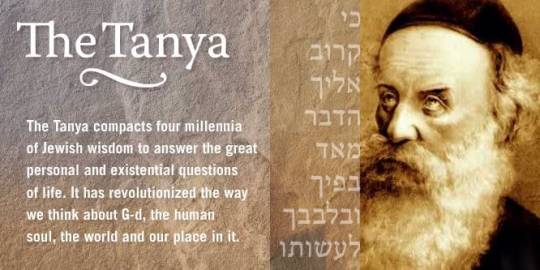
Daily Study
Daily Tanya
Iggeret HaKodesh, middle of Epistle 15 https://www.chabad.org/dailystudy/tanya.asp?tdate=9/5/2023#lt=primary
A chariot doesn't have its own agenda.
[Cultural Religions are themselves incommensurable. Being such, they have their established boundaries. It is inappropriate to assume to be able to make them into one religion. [furher; except perhaps for one 'trance' state, one 'mindstream', walkabout or thread, to realize - that we share a common home, with many rooms.]
What G-d calls us to do, is to grow in wisdom, understanding, and knowledge so that we may discern the wholesome truth
Relate with He/She who is the maker of boundaries for the Good of Creation
Stop our foolishness
stand upright
Together. Better and Larger Souls]
0 notes
Text
Solomon's Third Day.

Solomon did something no other ruler had done: He exposed his people to the world.
"He spoke about plant life, from the cedar of Lebanon to the hyssop that grows out of walls. He also spoke about animals and birds, reptiles and fish."
In the modern world we hire politicians and industry leaders to be our crowns and executives to lead us but they tend not to be expected to nurture us.
Certainly no other king in the Torah or the Tanakh made his people happy or was able to unify the king using the natural wonders God made for our appreciation and benefit.
Inherent to each species as with almost every word of scripture in Judaism is Gematria, words and numbers derived the infinuite combination of the letters that comprise God's Name:
The Pants and the Animals.
“And on the third day, when it was morning, there were sounds (Kolos) and lightning; and there was a heavy cloud on the mountain. And the sound (Kol) of the shofar [resounded] very powerfully... And the sound (Kol) of the shofar continued.... And G‑d answered him in a [loud] voice (Kol).”1
This verse mentions five Kolos, sounds or voices.2 Commenting on this, the Talmud states:3 A person who brings joy to a bridegroom will acquire the Torah, for the Torah was given with five Kolos, and there are five Kolos mentioned with regard to a bridegroom: “the voice (Kol) of joy, the voice (Kol) of happiness, the voice (Kol) of a groom and the voice (Kol) of a bride, and a voice (Kol) stating: ‘Give thanks to the G‑d of Hosts.’”4
The reason a person who brings joy to a bridegroom will acquire the Torah is that there is an inner connection between the fundamental nature of these two entities.5 (It is not appropriate to say that a person who brings joy to a bridegroom should acquire the Torah merely because the same number of Kolos are mentioned in both contexts without there being an inner connection between the two subjects. On the contrary,) the reason the same number of Kolos are mentioned with regard to both the Torah and a bridegroom is that there is an inner connection between them.
Thus the Alter Rebbe explains6 that the reason a person who brings joy to a bridegroom acquires the Torah is based on the principle “measure for measure.”7 The Torah itself (is called a bridegroom, because) the influence that it conveys to the Jewish people resembles the influence conveyed by a bridegroom to his bride.
The reason the Talmud [does not mention the thematic connection, and instead] focuses on the five Kolos mentioned in connection with the giving of the Torah (even though on the surface, it appears to be merely an external consequence) is that the number of Kolos mentioned in connection with the Torah and a bridegroom expresses the inner connection8 that reflects the essence of both the Torah and a bridegroom.
The Torah was given with five Kolos, the same number of Kolos mentioned with regard to a bridegroom, (not only because both the Torah and a bridegroom convey influence, for that is an obvious fact that does not require any proof, but also) because [they both convey the same type of influence]. For the influence the Torah conveys to the Jewish people cannot be compared to a teacher’s conveying a concept to a student, but instead resembles the inner, lofty influence that a bridegroom conveys to his bride, as will be explained.
All concepts in Torah are precise and serve as a lesson. Similarly, the fact that the Talmud focuses on the number of Kolos mentioned in connection with the Torah and a bridegroom (and not merely that they share the same number of Kolos) indicates that the number five also provides a lesson for us in this context.
II. The unique quality associated with the Torah that is expressed by the mention of five9 Kolos (and which expresses the special connection between the Torah and a bridegroom) can be understood by prefacing the explanation of the concept of a Kol.
A Kol draws down and reveals an entity’s quality; something that was previously hidden is revealed.10 For example, a human being’s voice reveals his intellect or his emotions.
Moreover, a person’s voice reflects and parallels the subject that it reveals. {For example, the tone of voice that expresses a command — a high and stern pitch — is different from the tone of voice which communicates an intellectual concept, as it is written:11 “The words of the wise are heard12 gently.”13}
Similarly, in the spiritual realms,14 there are different Kolos, modes of expression, each one distinguished from the other. The distinction between them reflects the difference in the objective each Kol is intended to accomplish.
From this, we can appreciate that the fact that the Torah was given with five different Kolos, modes of expression, indicates that there are five different dimensions, one higher than the other,15 each one being drawn down through one of the five types of Kolos.
This also explains the unique dimension of the Torah — that it was given with five voices. As is well known,16 the entire spiritual cosmos is divided into four types of worlds (which parallel the four forms of earthly existence: inanimate objects, plants, animals, and humans17). Moreover, these four different levels are reflected, not only in the worlds which are brought into being, but also in G‑d’s name Havayah (v-u-v-h),18 the active agent which brings the worlds into existence.
For this name contains the four letters that serve as the source for the four worlds19 (and within each world, for the four forms of existence: inanimate objects, plants, animals, and humans, in that world20).
For the above, they include:
Plant life:
When G‑d created the first man, He took him and showed him all the trees of the Garden of Eden, and said to him, ‘See My works, how beautiful and praiseworthy they are. And everything that I created, I created it for you. Be careful not to spoil or destroy My world—for if you do, there will be nobody after you to repair it.’”2
This midrash singles out the trees of the Garden of Eden—rather than the Garden itself—to represent the natural world G‑d created and the imperative to not destroy it.
Trees also symbolize the necessary environment for human life when the Jewish people enter the land of Israel. Encouraging us to emulate G‑d, the Midrash teaches:
“It is said, ‘Follow the Lord, your G‑d.’3 This means: follow His example. When He created the world, His first action was to plant trees, as it written, ‘And G‑d planted a garden [of trees] in Eden.’4 So you, too, when you will enter the land of Israel, planting trees should be your first involvement.”5
The Cedars of Lebanon:

A righteous individual may be compared to one of two kinds of trees—the date palm or the cedar. The date palm, as the verse attests, "gives fruit." It does not, however, grow so tall. The cedar, on the other hand, "grows tall" but does not give fruit.
A righteous individual may be compared to one of two kinds of trees—the date palm or the cedarA righteous person who resembles a cedar is one whose attention to his spiritual growth lifts him to great heights. Yet, because he is primarily focused on his own improvement, he does not "give fruit." His spiritual accomplishments are impressive but do not translate into a direct benefit for others.
The second type of righteous person is like the date palm. This is the person who takes time that otherwise could have been spent on his own development and uses it to attend his fellow. Having diverted his attention from his personal growth, he does not grow as tall, but he – like the date palm which bears delicious and nourishing fruit – provides life, energy and sustenance to others.
The character of the Levites whose task it was to assist others is like that of the date palm. Rather than concentrating solely on their own spiritual attainments, they were entrusted with the holy mission of being of service to those who performed the holy rites in the Temple. Instead of focusing exclusively on their own spiritual attainments, they made themselves of use to others.
Hyssops:

"This is the law of the metzorah1on the day of his cleansing: he shall be brought to the priest. Then the priest shall command to take for the one who is to be cleansed two living clean birds, and cedar-wood, and scarlet tola'at,2 and hyssop." (Levit. 14:2,4)
"How can he be fixed and healed? He should lower himself from his pride like a tola'at and a hyssop". (Rashi – from Midrash Tanhuma 3)
The one being purified is advised to take two birds, cedar-wood, and hyssop - [things which are both] tall and lowly.3 He should lower himself from his arrogance, so that [the kohen, who is the tzadik] can lift him up.
I heard the following parable in the name of my Master (the Baal Shem Tov).
A very tall man was standing in the sun, being scorched by its rays. A wise man saw from afar that the tall man was very hot, and did not know how to help himself - to cool himself down with "cold water on a weary soul". (Proverbs 25:25) What did he do? He sat in front of him and sipped water from a bottle, hoping that [the tall man] would see him and do likewise. The man with the bottle was very short, however, and that the tall man had to bend down his head and body in order to take a little water for himself. But because of his arrogance and his stature, he refused to lower himself - as if to show that he needed someone else!
The wise man understood this, and could find no way to get him to take a little water. Finally, he had to throw some water up into the [tall] man's face. Perhaps then he would drink a little and quench his thirst.
However, the tall man pressed his lips together so that not even a drop of water should go in, for that wasn't in keeping with his prestige. The water fell back into the mouth of the one who threw it, and as for the one who refused to drink, he died of thirst.
The allusion is to a great city, full of scholars and scribes, who refuse to hear wisdom and accept guidance on how to follow the way of G·d, until they pass on from [the city] and the generation, and leave the generation orphaned. Thus, it is written: "Hear and your souls shall live".4 (Isaiah 55:3) For listening to the wise and accepting their admonishment heals the body and the soul, as Maimonides writes, (De'ot, chapter 2:1) that they (the Sages) are the healers of the soul. As for a person who refuses to hear admonition, it is said: "The foolish despise wisdom and reproof". (Proverbs 1:7)
Tzora'at strikes a person because he lifts himself up like a cedar and refuses to accept criticism.
Tzora'at strikes a person because he lifts himself up like a cedar and refuses to accept criticism. Therefore, he should lower himself like a hyssop and accept admonishment, for this will lead to his healing and purification.
Animals are Lower Forms of Humanity:
In the Torah portion of Beha'alotcha, a group of Jews somewhat ungratefully complains to Moses that they miss the meat they used to eat in Egypt; all they get now is manna. (Num. 11:4-6) In response, G‑d tells Moses to inform the Jews that they will be given not just enough meat for a meal or two, but a full thirty-day supply.
Moses protests: "From where am I [to get] meat"?! (ibid.11:13) and later, "[There are] six hundred thousand footmen in the nation in whose midst I am, and You have said, 'I will give them meat and they will eat [for] a month of days.' Should [entire herds of] sheep and cattle be slaughtered for them, would it find them [satisfied]? Should all the fish of the sea be gathered for them, would it find them [satisfied]?" (ibid.11:21-22)A person ignorant of Torah is forbidden to eat meat….
What did Moses mean by his protests? After all, the world is full of nations much more numerous than the Jews, and they all seem to have enough to eat - yes, there would seem to be even more than enough if G‑d gathered together all those sheep and cattle, or "all the fish of the sea". And, in any event, who said anything about fish? It was meat the Jews asked for; they never mentioned fish at all, so what was Moses alluding to?
Now, on the one hand, the Talmud teaches that a person ignorant of Torah is forbidden to eat meat; (Pesachim 49b) such a person is incapable of the holy intentions necessary to elevate the meat to its spiritual source (a concept to be discussed below). This implies that it is the person who elevates the meat - as we would expect, since humans are superior to animals and lower forms of existence.
Birds:
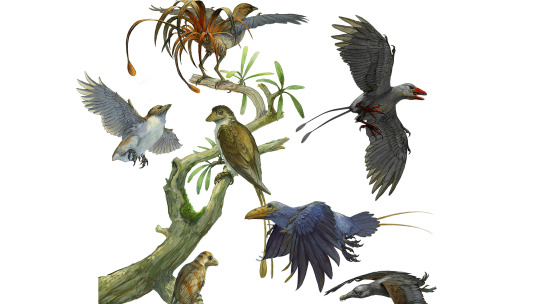
The Bird of Divine Providence
Nature has the ability to reveal the Divine within the concealed realms.
"…and the little owl and the fish owl and the long-eared owl…." (Lev. 11:17)
Our Rabbis [quoted by Rashi] have explained that this [the fish owl] is [a bird] that draws fish from the water.
When Rabbi Yochanan saw a fish owl he exclaimed, "Your justice is carried out even in the depths of the sea." (Psalms 36:7, Chulin 63a)
G‑d judges even the fish of the sea and arranges that the fish owl should catch those deserving punishment. [Rashi, on the above quote from the Talmud]The belief in Divine Providence is a fundamental precept of Judaism….
The belief in Divine Providence is a fundamental precept of Judaism. However, traditionally there has been some disagreement as to the extent of G‑d's involvement in the intricacies and minutiae of nature. According to some Jewish philosophers, G‑d merely supervises the special survival of the vegetative and animal life forms. His individual and direct involvement and supervision, however, is limited to human beings.
The Baal Shem Tov, however, taught that there is no such thing as coincidence at all. Every single one of the myriad minutiae constantly happening in our world is pre-planned and executed, in essence forming the ultimate choreographed ballet of existence. Every leaf turning in the wind, taught the Baal Shem Tov, is doing so by design; it may very well be on its way to a specific location to provide shade for a lowly worm.
This novel approach had its share of detractors. "Show us a source," cried the doubters. And, indeed, Rabbi Shneur Zalman of Liadi, an adherent to the Baal Shem Tov's teachings, did: possibly the most compelling among them is the above passage in the Talmud, which states unequivocally that the specific fish to be eaten by the fish owl is pre-ordained and chosen.
Taking a inner-dimensional approach, we may find reference to this discussion in Rashi's comment. An examination of the Hebrew word for "nature", "teva", reveals a relationship between it and the verb "to sink" or "to drown" - in Hebrew, "litbo'a". This implies that the divine vitality that is the true source of all life is concealed from our perception by the forces of nature that G‑d set into effect, just as sunken treasure is concealed by the waters of the sea. G‑d is intimately involved in everything that takes place, but that involvement is hidden from us, drowned by the physical reality that surrounds us.
However, in his comment on our verse from the Torah, Rashi teaches that it is this statement (and generally the recognition of G‑d's intimate involvement in the minutiae of life that it entails) that "draws fish from the water" - reveals the true state if reality and awakens us to the truth hidden beneath the "waters" of nature.
Reptiles:
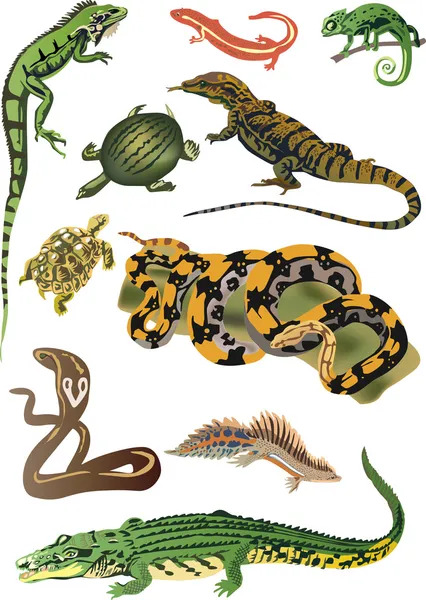
Amphibians and reptiles are vertebrates, like mammals, but unlike mammals, they are cold-blooded. This means that while birds and mammals generate their own heat, reptiles and amphibians rely on external sources of heat, such as the sun, to keep them warm.
There are a few differences between amphibians and reptiles. Amphibians have no scales. Examples of amphibians are frogs, toads and salamanders. They live in damp places where their skin won’t dry out. They start out their lives in water, breathing through gills, and some species stay in the water and breathe through gills their whole lives. Some species of amphibians take care of their young.
Reptiles, on the other hand, have dry, thick skin made of waterproof scales. They live on land, in warm places where they can bask in the sun. Examples of reptiles are snakes, turtles, and crocodiles. As reptiles grow, they occasionally shed their skin to reveal a new skin growing underneath. Reptiles generally do not take care of their young.
Fish:

The zodiac sign of the Hebrew month of Adar is the fish. It may be surprising to many that Jewish mysticism includes references to classical astrology, and the fish symbol has profound significance in both. I thought it would be appropriate to consider these aquatic creatures and what they might teach us.
1. Maintain a Forward-Facing Outlook
Most fish cannot swim backward (eels being a rare exception). Memories can ground us and help inform our decisions, but our sights should be set firmly on the present, with the goal of shaping the future. To paraphrase the 19th-century Lithuanian rabbi, Israel Salanter: as long we are alive, we can still accomplish.
2. Everyone Moves at Their Own Pace
While sailfish can move at nearly 70 miles per hour, the dwarf seahorse only covers about five feet in that same time. The latter's pace is so slow you can barely detect it’s moving at all. But it is. Likewise, even if our pace is slow, it doesn’t mean we are not progressing. King Solomon advised, “Educate a child according to his way.”1 Progress for one individual can look very different from that of another. We need not always be a sailfish. We just need to make sure we are swimming in the right direction.
3. Don’t Fall Asleep on the Job
Most fish rest, but they never sleep as humans do. They must remain alert to danger. When we’ve worked on ourselves and feel that we’ve reached a level of success, it’s easy to let our guard down. But as Hillel the Elder said, “Do not trust yourself until the day of your death.”2 Complacency can lead to backsliding, and losing much of what we have gained.
4. Your Sharp Edges Affect You Too
The fangtooth fish is several inches long, but its teeth are disproportionately large. It cannot even close its own mouth. That physical constraint allows a lot of food to simply float away. Being particularly sharp or combative can be an advantage in some instances, but having extra-sharp teeth might come back to bite us—or at least leave us limited by our inability to maintain social connections.
5. When a Leader Is Needed, Step Up
Rusty angelfish are born female. In time, one will become anatomically male and assume that role within the group. This teaches us about individual responsibility. Throughout our lives, we may rely on leadership figures to guide us, but when confronted with a challenge that requires us to step up, we each have the potential to become that guide.3
6. Don’t Be a Fish Out of Water
Fish need oxygen-rich water to survive. The first-century sage Rabbi Akiva was once asked why he continued to study Torah at a time when the Romans forbade it. He answered: As water is to a fish, so is Torah to the Jew.4 G‑d's teachings not only provide direction and purpose, but also the secret to Jewish survival.
7. Wherever You Roam, Your Soul Can Come Home
Salmon travel hundreds of miles and spend years in the ocean, far from their breeding grounds. And yet, when it’s time, they find their way back to the same riverbed in which they were spawned. Every human was created in the image of our Creator and has a mission to fulfill during his or her lifetime. As far as we may stray from our true identity, we can always circle back to our roots as G‑dly, G‑d-conscious beings.
0 notes
Text
2 Chronicles 28: 4-5. "Damascus."
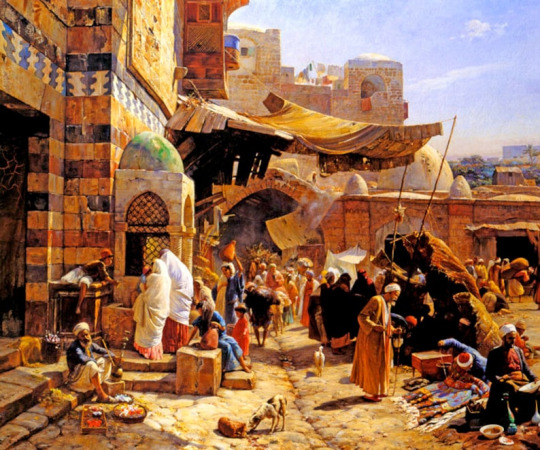
King Ahaz of Judah did a bad thing: He didn't pay attention to the needs of his people and paid attention to his buddies instead. This is adultery and corruption, it is also adolescent, and could be considered adultery. A king, after all is married to his people, not to his frat:
4 He offered sacrifices and burned incense at the high places, on the hilltops and under every spreading tree.
5 Therefore the Lord his God delivered him into the hands of the king of Aram. The Arameans defeated him and took many of his people as prisoners and brought them to Damascus.
He was also given into the hands of the king of Israel, who inflicted heavy casualties on him.
To burn incense we learned, is to fog the mind with nonsense. Even scripture is nonsense if it not followed by meditation and contemplation, ie, "what is real about these words, what is hidden, what is revealed?"
To pretend to understand scripture and then act like a child is blaspehmy. This is what is happens when the inexperienced burn the incense on the high places, places of worship, the hilltops, in the heart, and under spreading trees.
It is the job of the King to draw down God's love and spread it among th people, not containerize in ways that cause the Court, and then the Kingdom itself to become drunk on corruption:
וזהו On this basis, we can understand the verse:1 “[Who...] weighed the mountains with a scale and the hills with a balance?”
As the Alter Rebbe proceeds to explain, the redundancy in the verse is not merely a literary technique but refers to two different levels and approaches.
The “mountains” and the “hills” refer to [two different] types and levels of love. For there are, [in general,] two categories: mountains and hills, and the hills are on a lower level than that of the mountains.
I.e., the analogue parallels the analogy.
For the “hills refer to the Matriarchs,”2 who receive from the “mountains,” [i.e., the Patriarchs]. [“The hills”] thus refer to the love from the external dimension of the heart which results from logic and knowledge and meditation on the greatness of G‑d, which is [truly] vast.
והנה Now to refine one’s soul and illumine it with the light of this love,
I.e., even when one has meditated on the greatness of G‑d and has established a basis for love and fear, it is possible that he will not experience these emotions, for the fundamental material orientation of our bodies and animal souls may prevent that from happening. For the soul to experience love and fear of G‑d while clothed in a body, its power must be nourished by the influence of the Torah and its mitzvos.
it is necessary to draw the light of the Torah and its mitzvos down to it, for “the 248 commandments are the 248 limbs of the King.” 3
Just as a person’s limbs are the mediums to express his vitality within his body, the mitzvos — the limbs of the King — draw down G‑dly vitality into this world.
There is a cure for this kind of corruption, and it is called Aram and Damascus:
"To elevate the attitude, to seek the Most High in His Citadel, and engage in the Full Turn in the Pattern of Salvation. "
The noun ארמון ('armon) refers to a society's apex: a citadel or palace. The noun ראם (re'em) describes the wild ox, which was named possibly for the same reason why we moderns call a rising market a "bull" market. The similar verb ראם (ra'am) means to rise.
Damascus, derived from Mashak and Dama, mean to draw out, to arrest, to find the seat of life, to turn it into a product, fertile soil in which mankind can take root.
This complex word, Dama Mashak is the opposite essence of religion, politics and private life as we understand it on earth at this time. But if we burn the incense and "seek ye the Highest, the rest will follow."
0 notes
Text
Audio - Lessons in Tanya 83
Conclusion of chapter 43. We conclude this chapter with a short piece on how the fear/awe and love are levels and building blocks for spiritual growth. The Alter Rebbe suggested in this part that usually the pattern is lower fear, lower love, upper fear and upper love. However, there are times when the lower level love takes precedence over fear. We discuss how and when this would be.
Episode…
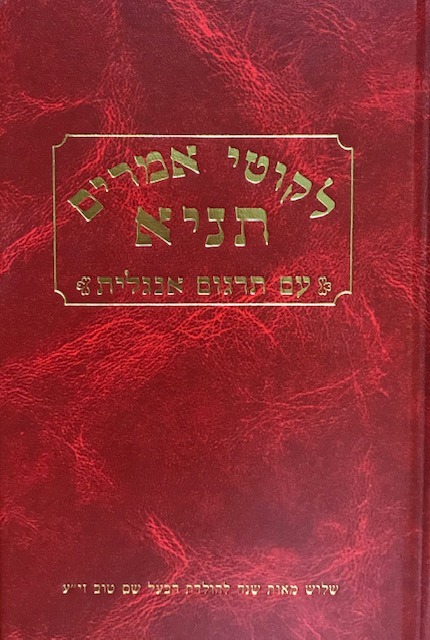
View On WordPress
#Alter Rebbe#awe#fear of Gd#Lessons in Tanya#love of Gd#new beginnings#new beginnings spiritual coaching and consulting llc#podcast#podcasts#spiritual growth#Spirituality#Tanya
0 notes
Photo
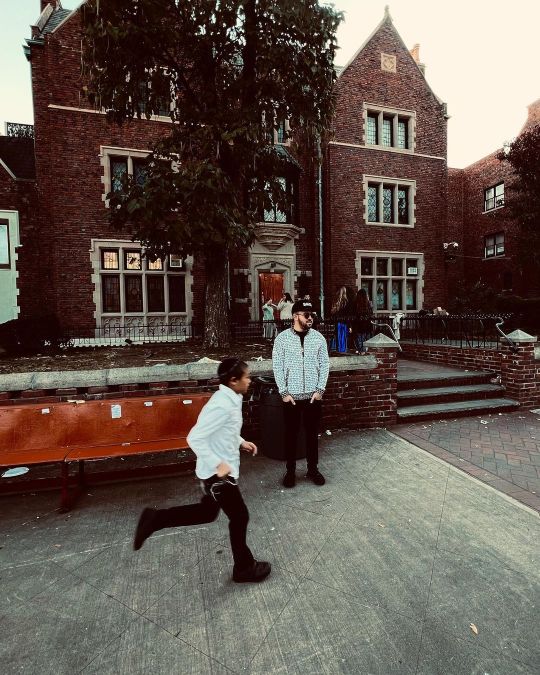
It's been a minute since I've been to Crown Heights, & this Shabbat was a dream. I didn't know who I would see as most my friends have moved, but I ended up bumping into a lot of friends that happened to be around for Shabbat & others that either knew of @thelightofinfiite from the posters here, the jacket, or the book that is out now.. it was a trip. I guess I made the Chabad Rebbe Bomber Jacket just in time for being here because wearing it in a sea of black hats & black suits, I stood out & every 3rd person stopped to ask where I got it from. I said, this website called www.lightofinfinite.com 🤪 Anyway, back when I lived here, my soul connected to this epic movement of Chabad & I spent Shabbatot davening at 770. What I didn’t get a chance to do when I lived there was dig deep into the teachings of Tanya; something that I try & do every day now. Alter Rebbe teachings keep me inspired & connected to life & light. It all only gets better with time - I can’t think of a more impactful & influential leader of the last hundred + yrs than The Lubavitcher Rebbe. There is hardly a corner of the globe that you can find yourself in that doesn’t include a Chabad house where you will be greeted with a smile & some warm food by a Rabbi & his wife & family, who continue to be inspired by the teachings of The Rebbe. The Rebbe believed in shining light on the soul; spirituality & oneness over physicality & separation. That which divides us conceals Hashem, & The Rebbe was about revelation. When I was married, I lived in Crown Heights & our chupah was at the world headquarters, 770. There are replicas of the building in different cities around the world. As I walked in circles, I felt the weight of what The Rebbe brought down to this life & when it came time for the tradition of going into the Yichud room, we were escorted into The Rebbe’s study & his kitel was placed upon my shoulders, little did I know at the time, The Rebbe would change my outlook & mission in life for the good & forever. There is never a week that goes by without my being inspired by a teaching of the Rebbe, generally in Likuttei Sichot, & I quote many of his insights from the Parashah in my writing. https://www.instagram.com/p/CkCe4BYrpPI/?igshid=NGJjMDIxMWI=
0 notes
Text
Daily Tanya Chapter 36
The dwelling place of the Creator
Chapter 36 opens with a statement of our Sages: "The purpose for which this world was created is that the Holy One, blessed be He, desired to have an abode in the lower realms."
As is elucidated in other hasidic texts, the wish of the Creator is expressed by the Sages as a "desire". The choice of word is to communicate that this want does not stem from some rationale, since desire is above and beyond the intellect. As the Alter Rebbe says in other places: "one cannot query a desire."
The creation of the various worlds
The various worlds were not created directly in the form in which they appear now.
Rather, the creation is a chainlike graded and downward succession, wherein the upper ring descends and loops into the lower ring after it, and so on, until the lower end has been reached.
And how is the descent from step to step accomplished?
The Alter Rebbe clarifies that this is done through the many “garments” that conceal the light and the life-force emanating from Him.
He explains says that the more the garments, the more the concealment, and the lower the descent.
This means that the changes in the levels reflect the changes in the absorption of Divine light. The descent from step to step expresses that in the upper world, the light of God has illuminated in a more revealed manner. This world is the lowest in degree; there is none lower than it in terms of concealment of His light, and no world compares with it for doubled and redoubled darkness; nowhere is G‑d’s light as hidden as in this world.
4 notes
·
View notes
Text
“Once, when Rabbi Dov Ber was engrossed in learning, his baby, sleeping in its cradle nearby, fell out and began to cry. The infant’s father did not hear the baby’s cries. But the infant’s grandfather, the Alter Rebbe, also engrossed in his studies in his room on the upper floor at the time, most certainly did. He interrupted his studies, went downstairs, picked the baby up, soothed it and replaced it in its cradle. Through all this Rabbi Dov Ber remained quite oblivious.”
“Subsequently, the Alter Rebbe admonished his son: ‘No matter how engrossed one may be in the loftiest occupation, one must never remain insensitive to the cry of a child.’”
-Heeding the Cry of a Child
776 notes
·
View notes
Text
the alter rebbe was against napoleon winning the war because he believed that if the jews had it too good physically, their spirituality would suffer.
i think i see what he meant, because america has been relatively safe for jews for the past several decades, and all the ultra orthodox jewish views are now very similar to christian views, as can be proven by the simple fact that ultra orthodox jews and religious christians, both voted for trump, and all the conservative crap that he stands for instead of voting for social services to help the less fortunate (something that used to be a core tenet in orthodox judaism)
#jumblr#bring on the hate#grew up chabad and this is anecdotal#but i've yet to meet a chabad rabbi who can prove this post wrong
7 notes
·
View notes